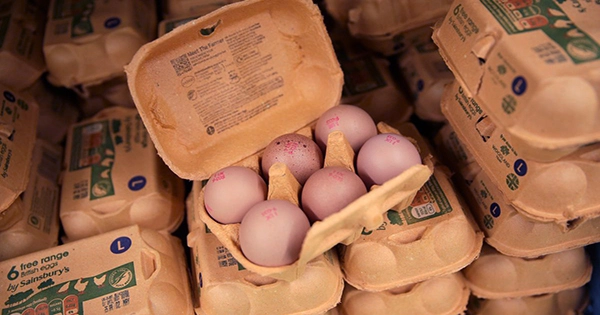For the time being, free-range eggs are unavailable in the United Kingdom. Unlike other of the UK’s recent food difficulties, this is not a supply chain issue, but rather the product of a “chicken lockup” and regulated marketing standards. The list goes on and on: “free-range,” “barn-raised,” “cage-free.” Here’s what all those phrases imply (in both the UK and the US) and why the UK is having a problem with so-called “free-range” eggs right now.
WHY ARE FREE-RANGE EGGS NOT AVAILABLE IN THE UK? More than 100 cases of avian influenza have been recorded in the UK since the beginning of November 2021, making it the country’s largest-ever epidemic. Farmers have been obliged to relocate all of their hens indoors in order to control the virus, meaning they can no longer be classified as “free-range.” According to the British Egg Industry Council, the eggs previously known as free-range will instead be branded as “barn eggs.”
In the United Kingdom, free-range eggs must originate from birds that have unrestricted access to outside pastures throughout the day. According to the Royal Society for the Prevention of Cruelty to Animals, free-range hens can be confined in barns at night to keep them safe from foxes and other predators, but only at a density of nine hens per square meter. Egg growers are allowed to confine their hens for up to 16 weeks while maintaining their free-range status under these rules. This is a loophole that is largely utilized to protect poultry in the case of a transmissible illness epidemic.
Since the UK’s hens have been in “lockdown” for four months due to avian flu, the 16-week “grace period” has ended, and the present batch of eggs can no longer be classified as free-range. Fear not: the prospect of bird flu poses a very minimal food safety risk to UK consumers, and it has no effect on chicken or egg consumption. However, this means the eggs are no longer covered by the stringent restrictions that govern egg marketing.
“Marking free-range packets and eggs temporarily as Barn is not only the simplest practical answer, but it also ensures customers can continue to buy eggs from free-range hens, although temporarily confined,” said Mark Williams, Chief Executive of the British Egg Industry Council, in a statement.
IN THE UNITED STATES, THE DIFFERENCE BETWEEN FREE-RANGE AND CAGE-FREE EGGS, In the United States, things are a little different. In comparison to the United Kingdom and the European Union, the United States has somewhat different (and perhaps less rigorous) food and agriculture rules, which include eggs. Free-range eggs must be produced by hens who are kept in a fashion that enables them access to the outdoors during their laying cycle, according to the USDA. However, there is little government monitoring of the external environment’s quality.















